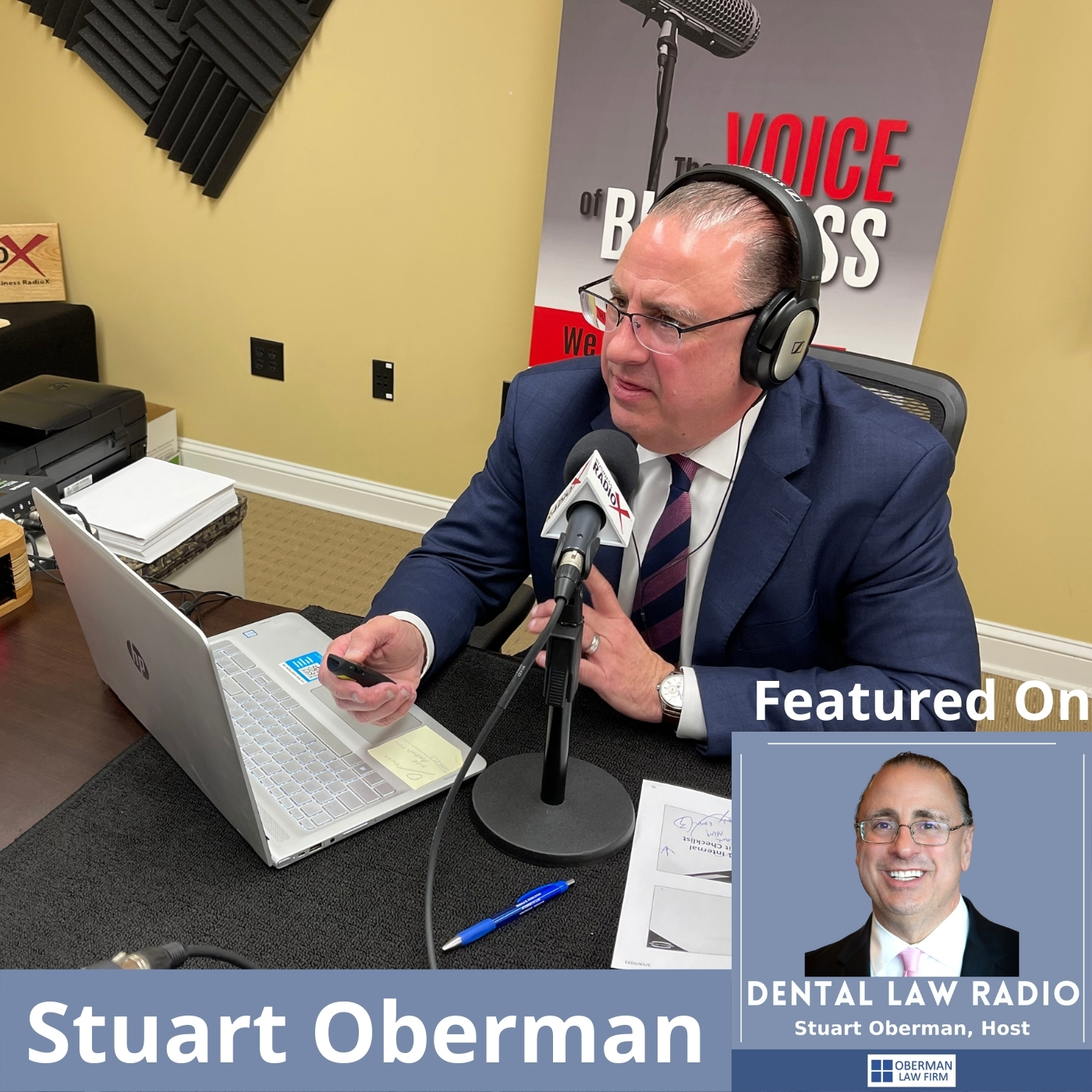

Dental Board Complaints (Dental Law Radio, Episode 26)
Patients can file dental board complaints for reasons which are spurious or even sinister. How do you lessen the likelihood of such complaints? As Stuart Oberman explains in this episode of Dental Law Radio, there are some basic “know your patient” and patient experience practices you can implement to lessen the livelihood of these complaints, and if they are filed, mitigate their risk to your practice. Dental Law Radio is underwritten and presented by Oberman Law Firm and produced by the North Fulton studio of Business RadioX®.
TRANSCRIPT
Intro: [00:00:02] Broadcasting from the Business RadioX Studios in Atlanta, it’s time for Dental Law Radio. Dental Law Radio is brought to you by Oberman Law Firm, a leading dental-centric law firm, serving dental clients on a local, regional and national basis. Now, here’s your host, Stuart Oberman.
Stuart Oberman: [00:00:25] Welcome everyone to Dental Law Radio. I always say that it’s a great profession, except for the patients. The patients will drive you nuts. And, I always say in the meetings that I’m a pleasure speaking at, online, tell our clients, it is not if you’re going to get a board complaint, it is when because what happens is that it is so easy nowadays to file a board complaint.
Stuart Oberman: [00:01:01] Many things are done online in many states. In some states, I can literally go out of your office after I just had a cavity filled, go to QT, grab a Diet Coke, and I can sit in the parking lot and file a board complaint because I didn’t like you, I didn’t like your staff, I didn’t like how much you charged me. It is too easy.
Stuart Oberman: [00:01:28] So, what happens is you get this letter notice from the board. You’re shocked, you’re angry. What are you going to do? Well, the question is how do you prevent that. Going forward is a whole different scenario than prevention. So, you know, a couple of things to think about on the prevention side. Okay.
Stuart Oberman: [00:01:50] So, a patient you do not know is more likely to file a complaint than Aunt Betty who you’ve seen for the last 30 years. Patients who do not pay their bills are a huge problem. You’ve got to look at that. Is it risky? Is it risky to file or send him over to collections than it is to let $100, $200 go? Look, at the end of the day, it’s a board’s responsibility to make sure that you are doing your job correctly.
Stuart Oberman: [00:02:18] However, a couple of things. Preventive. Before that patient leaves your practice, you better make sure they understand what’s expected, what’s not expected. There’s no way possible that you can have an inkling as to what that patient is thinking. If there is a concern, then you need to make an additional appointment with that patient because an extra five, 10, 15 minutes will save you a world of headaches down the road. If you have a problem patient, again preventative, you have your assistant in there with you telling the patient what is good, the bad, the ugly, and straightforward.
Stuart Oberman: [00:03:03] One thing I always say is you need to look your patient in the eye. That’s a lost art in today’s world. When you’re looking at your patient and you’re telling the patient what’s going on, that’s a whole different ballgame. You’re going to pick up a lot of things you’re not going to pick up by talking on telephone. Always, always, always give the patient extra time if they need it, and, let me say this if you’ve got a problem patient, we had doctors that will not talk to patients.
Stuart Oberman: [00:03:40] If I get a patient that is a problem patient and communicates with my office manager, whomever is not working, gosh, pick up the phone, call these patients. I say guys plural ’cause I’m from the North. So, pick up the phone. Call the patient, get the problem solved. Now, for 10 minutes, they’re going to vent and they’re going to blow your ear off, which is fine, let them vent. [inaudible] could this problem matters and I call the patient and I’ll say, “Hey, look, I represent Dr. Jones. Tell me what’s going on.” For 15 minutes, I’m lambasted about everything that the doctor didn’t do, the price, the staff, everything. Great. I’m a venting board. Now, let’s get to the problem-solving matter. Okay.
Stuart Oberman: [00:04:28] So, when a board matter, when you get a board letter, you got to make sure you understand what the complaint is, the timeframe within which this client filed that complaint. And, let me tell you this. You don’t always have to give a complaint to your malpractice carrier. It is up to you and the facts and circumstances. But let me make this statement very clear. If you have someone from your malpractice carrier that’s representing you at a board hearing, they better know what they’re doing.
Stuart Oberman: [00:05:02] We’ve had cases that I have handled and I’ve made it very clear to the malpractice lawyer, “Look, we do this time and time and time again. This is your second hearing. It’s my 700th hearing. Sit back, relax. If you want to join the meeting, fine. Let us take the lead. We know what we’re doing. We know the boards. We know what’s going on, and you can report back to the insurance company at a later date.” So, you better know the experience of that lawyer, how to respond. And, if that lawyer is just showing up without responding or sending down different documents or what be required to be proactive, you need to find someone else.
Stuart Oberman: [00:05:42] So, the board’s going to request, you got to be ready for this, an updated CV, copies of your license, continuing CE education requirements. It’s amazing how many of our doctors can’t find their CE and wait until after the board hearing, [inaudible] if it’s informal to gather it up. These are things you need to gather up beforehand. Give a complete copy of all the records. The last thing you want in the world is the board to discover that you’re not being forthcoming with records. That is a huge, huge problem.
Stuart Oberman: [00:06:16] So, then let’s talk about defenses, defenses. Document your instructions to the patient [inaudible]. Document every complaint, every concern. Put it in the file. Our previous podcast, we discussed the certain things you can’t put in the file, certain things you do not want to put in a file. Derogatory comments, comments regarding race, color, [inaudible], sexual origin. Those are inappropriate. It should never be in a file. Keep copies of all your correspondence. Keep records of all incidences. Look, things are going to happen. Document him, keep him, keep him in the chart. Update your CV. Update your attendance. Keep your resume up to date. And, note, note, note extensively all problems with that particular patient. Document it, document it, document it.
Stuart Oberman: [00:07:17] So, what are the most common complaints that we receive? And, we receive a lot of complaints from our dental offices. A lot of them are garbage, but some of them are very realistic and we’ve got to deal with them. So, what’s the number one complaint? It’s hard to say.
Stuart Oberman: [00:07:34] Let me go through some of these things, but it’s hard to say what’s number one and number 10. But what we consider unprofessional conduct is a failure to release records. You want to get an OSHA complaint, you withhold records. You want to get a board complaint, you withhold records.
Stuart Oberman: [00:07:52] Substandard practice. License expires when you’re hygienist and you’re associate doctors.
Stuart Oberman: [00:07:59] Malpractice claims. Be thorough.
Stuart Oberman: [00:08:04] Sexual misconduct on both sides of the fence, male and female. There are things that are absolutely inappropriate.
Stuart Oberman: [00:08:15] Now, board complaints will also come from your staff. So, you’ve got to be careful also with patient relations.
Stuart Oberman: [00:08:25] Financial issues. Billing for services that are not rendered, multiple billing and billing discrepancies. Look, there’s times we’ve been in board complaints and we thought it was clinical. Clinicals was fine and we got absolutely hammered on the financial side because it wasn’t documented. There’s double entries. Lab referrals were incomplete. So, those are things that you’ve got to take a look at on a broad scale that may go wrong.
Stuart Oberman: [00:08:53] So, what I would do is, on the complaint side, figure out what the problem is with your patients. Figure out what needs, how the problem needs to be rectified. Take a look at these proactive matters that we’ve discussed. Review them internally with how your procedures are going. And, I will tell you, the longer a problem goes on, the bigger the fire, the more expensive it gets. A problem matter is happy when it’s closed. Get it done, get it closed, get it released.
Stuart Oberman: [00:09:32] That is a very, very, very quick update on dental board complaints. Again, I could talk a whole day on this. Just take a look at a couple of things. Take a look at your procedures and everything should work out okay.
Stuart Oberman: [00:09:46] Thank you for joining us on Dental Law Radio. My name is Stuart Oberman. If you have any questions, please feel free to give us a call, 770-886-2400. My email is stuart, S-T-U-A-R-T, @obermanlaw.com. Thanks for joining us and have a fantastic day.
About Dental Law Radio
Hosted by Stuart Oberman, a nationally recognized authority in dental law, Dental Law Radio covers legal, business, and other operating issues and topics of vital concern to dentists and dental practice owners. The show is produced by the North Fulton studio of Business RadioX® and can be found on all the major podcast apps. The complete show archive is here.
Stuart Oberman, Oberman Law Firm

Stuart Oberman is the founder and President of Oberman Law Firm. Mr. Oberman graduated from Urbana University and received his law degree from John Marshall Law School. Mr. Oberman has been practicing law for over 25 years, and before going into private practice, Mr. Oberman was in-house counsel for a Fortune 500 Company. Mr. Oberman is widely regarded as the go-to attorney in the area of Dental Law, which includes DSO formation, corporate business structures, mergers and acquisitions, regulatory compliance, advertising regulations, HIPAA, Compliance, and employment law regulations that affect dental practices.
In addition, Mr. Oberman’s expertise in the health care industry includes advising clients in the complex regulatory landscape as it relates to telehealth and telemedicine, including compliance of corporate structures, third-party reimbursement, contract negotiations, technology, health care fraud and abuse law (Anti-Kickback Statute and the State Law), professional liability risk management, federal and state regulations.
As the long-term care industry evolves, Mr. Oberman has the knowledge and experience to guide clients in the long-term care sector with respect to corporate and regulatory matters, assisted living facilities, continuing care retirement communities (CCRCs). In addition, Mr. Oberman’s practice also focuses on health care facility acquisitions and other changes of ownership, as well as related licensure and Medicare/Medicaid certification matters, CCRC registrations, long-term care/skilled nursing facility management, operating agreements, assisted living licensure matters, and health care joint ventures.
In addition to his expertise in the health care industry, Mr. Oberman has a nationwide practice that focuses on all facets of contractual disputes, including corporate governance, fiduciary duty, trade secrets, unfair competition, covenants not to compete, trademark and copyright infringement, fraud, and deceptive trade practices, and other business-related matters. Mr. Oberman also represents clients throughout the United States in a wide range of practice areas, including mergers & acquisitions, partnership agreements, commercial real estate, entity formation, employment law, commercial leasing, intellectual property, and HIPAA/OSHA compliance.
Mr. Oberman is a national lecturer and has published articles in the U.S. and Canada.
Oberman Law Firm
Oberman Law Firm has a long history of civic service, noted national, regional, and local clients, and stands among the Southeast’s eminent and fast-growing full-service law firms. Oberman Law Firm’s areas of practice include Business Planning, Commercial & Technology Transactions, Corporate, Employment & Labor, Estate Planning, Health Care, Intellectual Property, Litigation, Privacy & Data Security, and Real Estate.
By meeting their client’s goals and becoming a trusted partner and advocate for our clients, their attorneys are recognized as legal go-getters who provide value-added service. Their attorneys understand that in a rapidly changing legal market, clients have new expectations, constantly evolving choices, and operate in an environment of heightened reputational and commercial risk.
Oberman Law Firm’s strength is its ability to solve complex legal problems by collaborating across borders and practice areas.
Connect with Oberman Law Firm:
Company website | LinkedIn | Twitter















